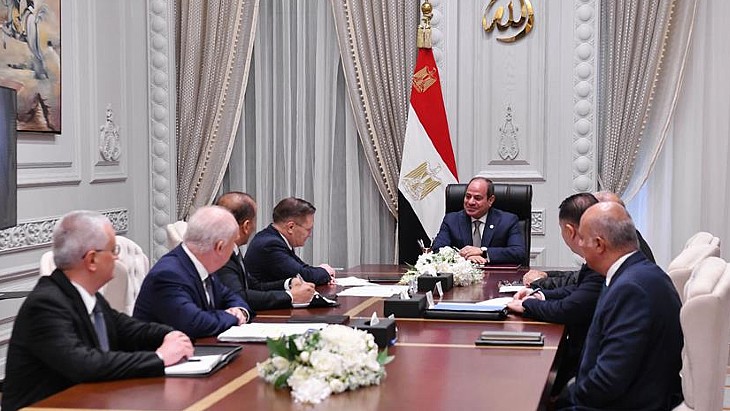Following the talks with the president, a Protocol on Amendments to the Intergovernmental Agreement on Cooperation in the Construction of a Nuclear Power Plant in Egypt was signed at the Ministry of Electricity and Renewable Energy.
It relates to the design work and supply of equipment and materials and construction, installation and commissioning work for a physical protection system for the El Dabaa plant site.
A related supplementary contract to the plant's engineering, procurement and construction contract was also signed by the President of Atomstroyexport Andrey Petrov and the Chairman of the Nuclear Power Plants Authority Sharif Helmy.
Rosatom said the site will be equipped with modern safety systems fully compliant with IAEA standards.
During the trip to Egypt Likhachev attended a ceremony to inaugurate a new training centre at the nuclear power plant site. The 5,000 square-metre centre includes a production shop, full-scale simulators and classrooms for theoretical classes and computer training. It is expected to allow training and skills development for about 20,000 workers.
Likhachev said: "The construction of the El Dabaa nuclear power plant in Egypt is an absolute priority for us. Thanks to the well-coordinated interaction of the Russian and Egyptian sides, full-scale construction and installation work is currently under way at the plant site on all four power units.
"More than 24,000 people are involved in the implementation of the project every day, with the majority of the team being Egyptian citizens. This contributes to the development of local competencies and the creation of new jobs."
Mahmoud Esmat, Minister of Electricity and Renewable Energy, said that the signing of the supplementary protocol and the contractual annex represented an important step towards completing the El Dabaa nuclear power plant project ... and "represents a true reflection of the fruitful cooperation between Egypt and Russia to implement the national project in line with Egypt's Energy Strategy 2040, which aims to achieve a balanced and sustainable mix of energy sources and enhance reliance on clean electricity".
The background
El Dabaa will be Egypt's first nuclear power plant, and the first in Africa since South Africa's Koeberg was built nearly 40 years ago. The Rosatom-led project, about 320 kilometres north-west of Cairo, will comprise four VVER-1200 units, like those already in operation at the Leningrad and Novovoronezh nuclear power plants in Russia, and the Ostrovets plant in Belarus.
Under the 2017 contracts, Rosatom will build the plant and also supply Russian nuclear fuel for its entire life cycle, including building a storage facility and supplying containers for storing used nuclear fuel. It will also assist Egyptian partners in training personnel and plant maintenance for the first 10 years of its operation.
The four units are being built almost concurrently, with first concrete at unit 1 in July 2022, followed in turn by the others, concluding with first concrete at unit 4 in January 2024. Egypt's aim is for 9% of electricity to be generated by nuclear by 2030, which would be achieved by the commercial operation of the first two units by that time, directly displacing oil and gas.





_13505.jpg)
_87975.jpg)
_67826.jpg)
_87695.jpg)





